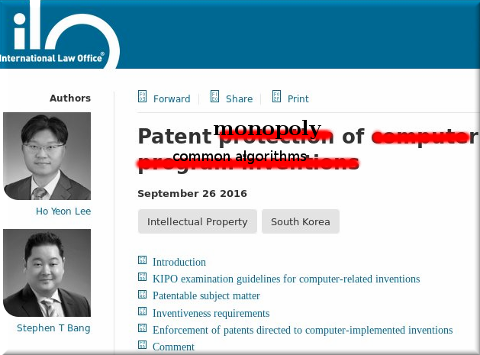

AS SOFTWARE DEVELOPERS often insist, copyrights are enough for them. These protect against misuse, plagiarism and so on. Software patents, given the inability to inspect binary files and properly study them, don't add any more protection.
In recent years, there has been substantial interest in changing existing law and practice in order to expand the protection for computer program inventions. The Korean Intellectual Property Office (KIPO) sought to enact such a change by officially releasing its revised Examination Guidelines for Computer-Related Inventions on July 1 2014. Three months later, an amendment bill to the Patent Act was submitted to the National Assembly, which attempted to broaden the scope of protection for computer-related inventions (eg, by opening up the possibility of patentees bringing infringement claims against online sellers of an allegedly infringing computer program, something which would not be subject to infringement liability under the guidelines). The National Assembly seemed to recognise that the proposed amendments could have profound effects on the software industry and thus rejected them, noting that more opinions from the industry were needed to gain a consensus on this issue.
The week before last I hosted a webinar for IAM Market entitled Readying a Patent Portfolio for Sale: What You Need to Know to Be Successful. Over 350 people signed up to get the materials and the recording, while close to 200 listened live as presenter Kent Richardson, a partner at Silicon Valley-based Richardson Oliver Law Group, talked through his slides and then answered questions from me and from attendees. It was a fascinating hour, which my colleague Jack Ellis has written up in a blog for the IAM Market knowledge centre (where there are also details about how you can get hold of the presentation, talk and interview).
This week I am in Gothenburg for the CIP Forum and yesterday at a session about defensive patent aggregation something that Kent (who is also here and took part in the session) said during the webinar came back to me. As a firm that does a lot of transaction-based work, ROL closely monitors activity in the patents sales market, in particular packages being offered by brokers. IAM subscribers will know that each year ROL produces an update for us about the activity it is seeing in areas such as pricing, sales rates, package sizes and so on – the next one will be published in issue 81 of IAM, which comes out at the end of November. One of the things it is set to show, Kent stated in our conversation, is that prices finally seem to have stabilised, essentially because they probably could not go any lower, and that for the first time it looks like operating companies are buying more than NPEs are.